Prof. David Waxman seeks pure scientific delight in Shanghai
Early each morning, a foreigner, like many Chinese people, can be seen cycling or walking on his way to work. He is casually dressed and perhaps you will not guess that this seemingly ordinary person is a theoretical biologist, who is probably puzzling over a research problem as he travels.
Speaking of his experience of meeting with Chinese president Xi Jinping, after receiving the 2013 Friendship Award, he just smiled modestly as a typical Englishman.
He is David Waxman. March 21, 2009 was the precise date of his first arrival in China. That day, he set foot in Shanghai for a visit to Fudan University. Since then, he has visited China many times as a guest professor. In July 2011, he resigned his job at the University of Sussex and came to Fudan University with his wife Marie Harder, beginning a full-time academic position at Fudan. Ever since, David has devoted himself to doing research and making a contribution to China’s scientific research cause.
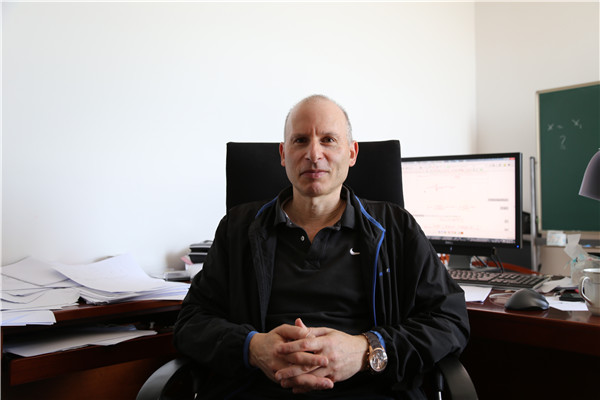
(David Waxman, Professor of Biology, poses for a photo at the Centre for Computational Systems Biology, Fudan University.[Photo/David Waxman])
An explorer benefiting from China’s talent attraction policies
Scientists seem to be born with a thirst for novelty and a spirit of exploration. Upon his first arrival in Shanghai, David was not overwhelmed by culture shock, even though he could only recognize the numbers on the signs while walking on a street full of Chinese characters. He said the novel environment was not overwhelming but stimulating and exciting for him. Once he got lost while cycling at Gongqing Forest Park, and, as he put it, “The most interesting things are not found on normal roads.”
“Don’t be apprehensive”- that’s David’s advice for foreigners who come to Shanghai. “Once given a chance to experience the novel, why not embrace it?” After living in the city for nearly a decade, he thinks that life here is extremely comfortable and stimulating and that Shanghai is probably the one of the safest places in the world to live.
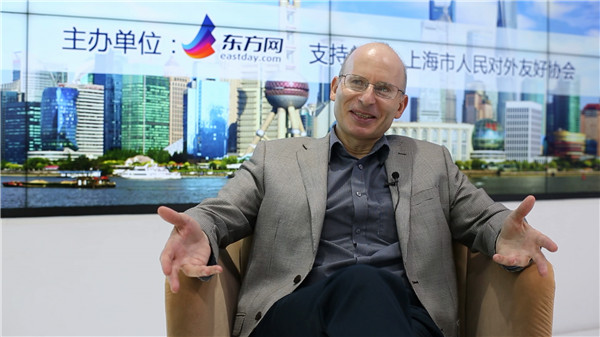
(David Waxman has an interview with eastday.com.)
While he was talking, wisdom was revealed from David’s eyes through his glasses. With systematic and thorough research achievements in the field of quantitative biology, he already has several scientific findings published in world-class journals including both “Nature” and “Science”, though he maintains an attitude of modesty. In his own words, his career has benefited a lot from Shanghai, a place that has always been attractive for him. He thinks it’s good for China to have foreigners come here. “One of the most obvious [attractions for China] is to have people from overseas come to China. You want to work with people that think differently to you and have different knowledge to you. If these people, like professors, post docs and PhD students, come to China, then you’re going to learn something, but working with them you’re also going to contribute something different; looking at the world of science in different ways may lead to different and interesting outcomes,” said David.
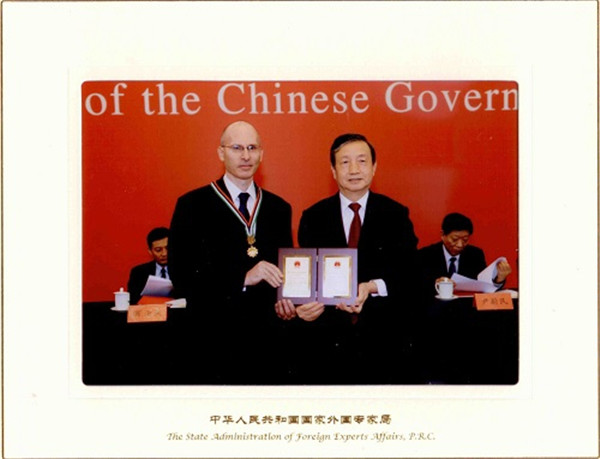
(David Waxman was honored with the 2013 Friendship Award for his academic contribution and friendship with China.)
Thanks to the China’s talent attraction policies which in particular welcomes the inflow of foreigners, more and more highly sophisticated talents like David have been attracted to China, forming a think tank and a strong force for China’s modernization. Many of them are top-level experts in engineering materials, life science, information science and other important scientific fields. Some work in the developed eastern part of China, while others devote themselves in the Midwest. Coming to China due to the opening-up policy, they bring their wisdom into full play, promote economic and technological exchanges between China and the world, and furthermore, help China go towards the center of the world. As one of those foreign talents in Shanghai, David is enjoying his life here.“I recently renewed my contract with Fudan. And my wife is very happy to continue working here,” he said.
Delighted with Shanghai’s progress in scientific research
While in Shanghai, David has worked mostly on population biology. He uses methods from mathematics, probability and statistics along with results from subject, such as physics or financial mathematics, to make progress in biology. Leading a research team of his own, David is now working on interdisciplinary collaborations with various institutes. Along with his collaborators, he has published a number of research papers in this area. Amongst these, he has produced results on the simulation of the random behavior of a population and a flexible method of evolutionary control. David believes these to be useful contributions to population genetics and other research fields.
Over the past decade, the professor has seen Shanghai’s efforts in turning itself into a global innovation center. Nine years ago, when he first visited Shanghai, there was already a lot of scientific research going on in Shanghai. However, now it’s greatly expanded in terms of size and level. A lot of money has been fed into research.
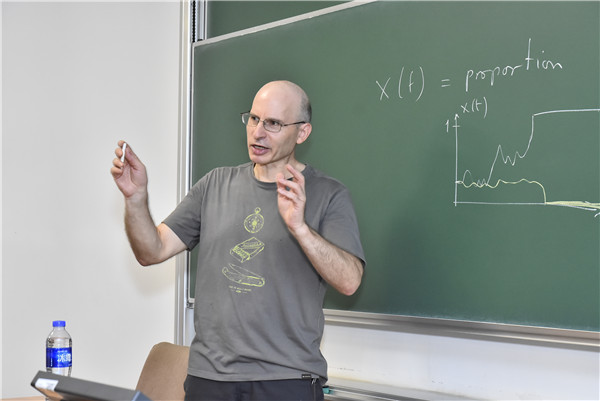
(David Waxman at class [Photo/Fudan University])
According to statistics revealed last year, in 2016, a total of 1,568 billion yuan was invested in R&D across China, an increase of 10.6% over the previous year. And the ratio of R&D expense to GDP was 2.1%. Nationally, Beijing and Shanghai invested more than 100 billion yuan in R&D and ranked first and second respectively. David spoke highly of Shanghai in this regard. “That's very positive. As a scientist, you want to see scientific research backed in a very serious way so science can make significant progress. I know China is one of the largest producers of scientific papers in the world, I think in part because of efforts like what’s going on in Shanghai.”
David also observes that there has been acceleration in the amount of funding for “big science”, which he believes is a very positive change. Big science refers to ambitious interdisciplinary projects which require a lot of funding and expensive and complex devices. For instance, in the Institute of Science and Technology for Brain inspired Intelligence at Fudan University, which houses the center where David works, there’s lots of money for equipment and personnel. Right now they’re buying state-of-the-art magnetic resonance imaging machines. Indeed this Institute, as one of the largest brain science institutes in Shanghai, is dedicated to developing technologies of the future, like brain-inspired AI, and is helping to empower China’s Brain Project, along with finding cures for major brain diseases like depression. Delighted by the attractive R&D environment of Shanghai, David said, “There is money in the system that allows people to do very modern things, very complex things at the cutting edge of the subject.”
Standing at the forefront of the world of science and technology, David also talked about the status of research in the whole country. Compared with other countries, China, in his eyes, is now placing much focus on applied research, which is correct for a developing country seeking to better the society. However, as a fundamental researcher himself, he thinks both fundamental and applied work should also be emphasized. “Purely curiosity driven research, most of the time, produces nothing very special, but sometimes something completely unexpected arises. Crazy ideas may come to fruition and change many things.” Envisioning his future at Fudan, the professor was sure that he would be intrigued by something interesting and possibly do research in a different direction. He says that taking skills and knowledge from one area to another, can often lead to novel and unanticipated results. Indeed his original research was in physics before he turned to biology.
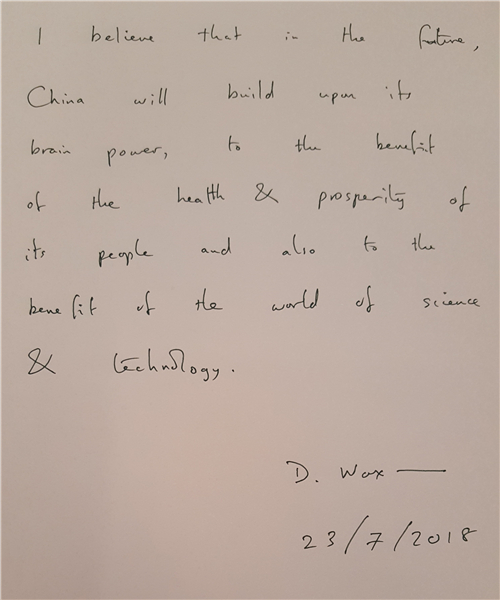
(David sends his wishes for China’s new journey of reform and opening up)
